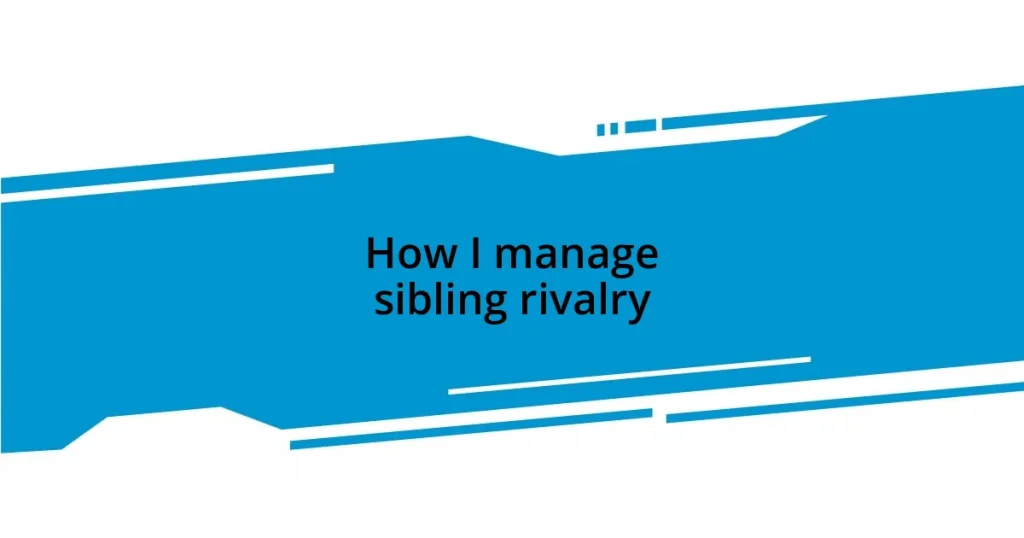Key takeaways:
- Sibling rivalry often arises from competition for parental attention, personality differences, and perceived favoritism, leading to jealousy and conflict.
- Encouraging open communication and promoting collaborative activities can effectively manage sibling rivalry by fostering understanding and reducing competition.
- Recognizing signs of rivalry, such as constant bickering and emotional withdrawal, is crucial for addressing deeper emotional issues within sibling relationships.
- Seeking professional help can provide valuable tools for conflict resolution when sibling rivalry escalates beyond typical disputes.
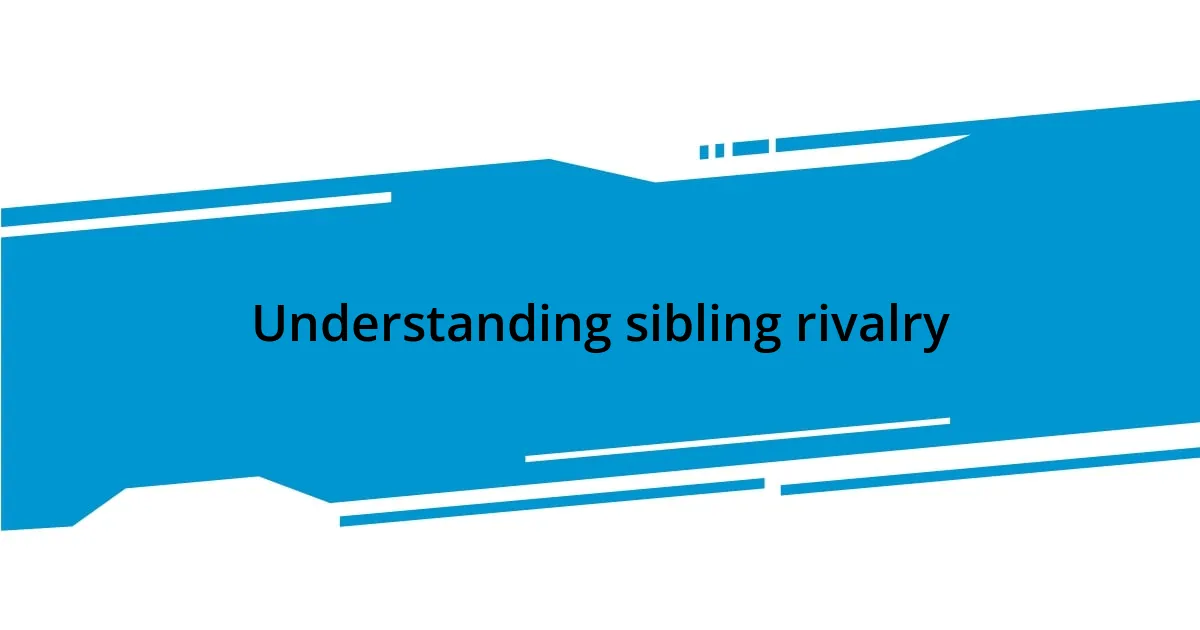
Understanding sibling rivalry
Sibling rivalry is a natural part of growing up, often characterized by competition for parental attention and affection. I remember a time when my brother and I were both vying for the last cookie; it turned into a full-blown debate over who had more chores that week. Doesn’t it sometimes feel like the smallest issues can escalate into major standoffs?
Understanding that these rivalries often stem from a desire for recognition makes all the difference. I’ve seen how even the subtlest comparison between siblings can trigger feelings of jealousy or inadequacy. Have you ever noticed how one compliment can turn into a competition to earn even more praise?
Emotions are running high in these moments, and it’s vital to acknowledge them. I’ve found that validating each child’s feelings, rather than dismissing them as petty, can significantly help de-escalate the tensions. How often do we overlook the emotional currents beneath a simple quarrel? Recognizing these underlying emotions can lead to healthier interactions and a stronger sibling bond over time.
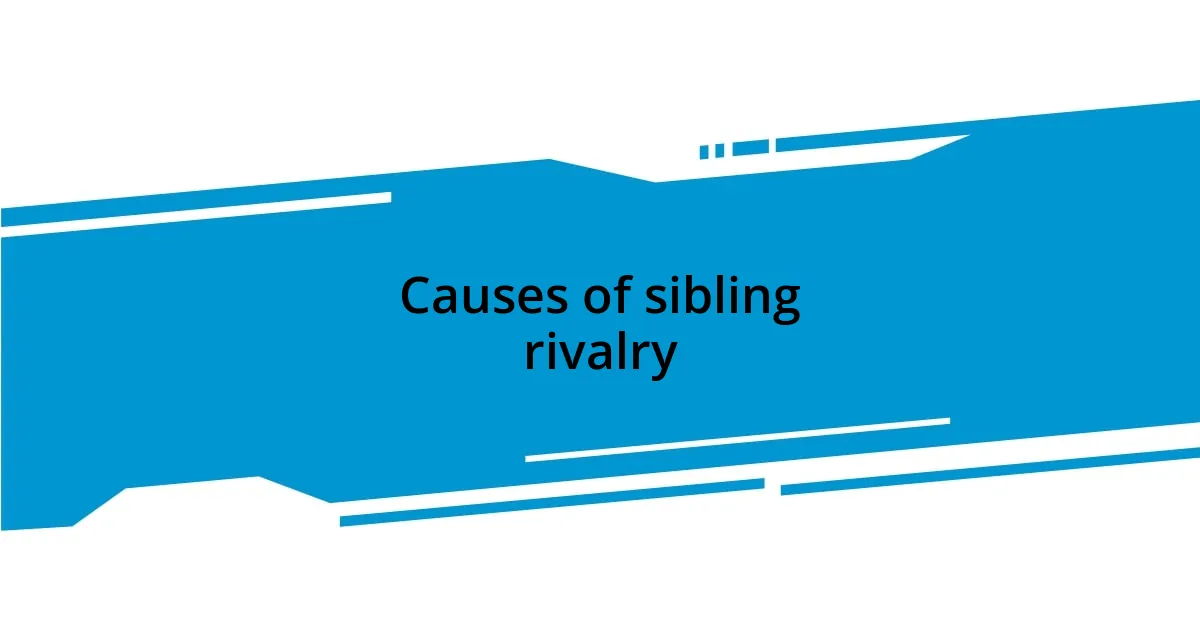
Causes of sibling rivalry
Sibling rivalry often arises from a mix of personality clashes, competition for attention, and even the stage each child is at in their development. I remember my sister’s fascination with drawing; every time she created something new, it seemed to overshadow my efforts to impress our parents. This can create a cycle where each child feels they must outdo the other, leading to constant friction.
Here are some common causes of sibling rivalry:
-
Parental Attention: Children often feel they must compete for their parents’ love and validation, especially when a new sibling arrives.
-
Personality Differences: Unique traits can lead to misunderstandings and conflicts. For instance, an extroverted child may clash with a more introverted sibling.
-
Different Interests and Talents: I’ve seen siblings battle over whose hobbies are more valued can spark jealousy, as each child strives to gain recognition in their own way.
-
Age Gap Dynamics: The challenges of differing maturity levels can amplify rivalry, as younger siblings may feel left out or older siblings might feel burdened.
-
Parental Favoritism: Whether intentional or not, perceived favoritism can deeply impact sibling relationships and fuel resentment.
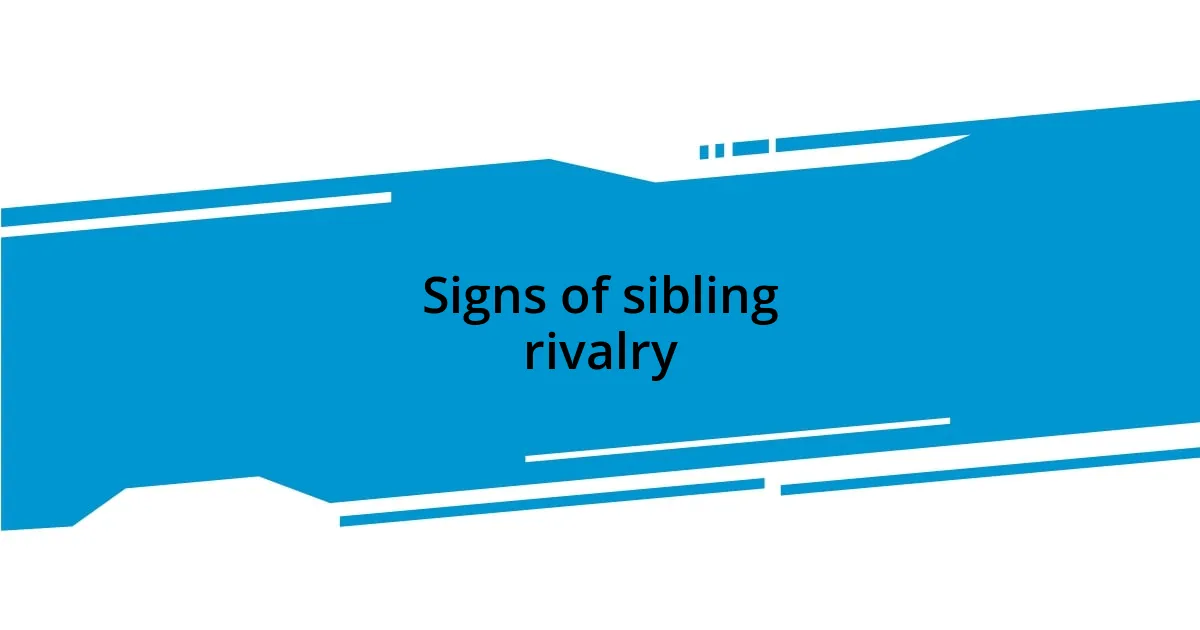
Signs of sibling rivalry
Sibling rivalry can manifest in various signs, often indicating deeper emotional currents at play. One common sign to watch out for is constant bickering. I remember the seemingly endless squabbling between my younger sister and me over trivial things like the remote control. These minor disputes can escalate, reflecting a struggle for control and validation within the sibling relationship.
Another sign is the emergence of competition in various aspects of life, be it academics, sports, or even friendships. I’ve noticed how my twins often push each other in their studies, each trying to outshine the other. This competitive behavior can be healthy in moderation but may indicate underlying rivalry when it leads to negative feelings or resentment.
Lastly, emotional withdrawal is a significant indicator. I recall times when my brother would retreat to his room after I received praise, feeling overshadowed. Such behavior can signal hurt feelings, underlying jealousy, or the need for reassurance that each sibling is valued equally, reminding us that emotional expressions, both positive and negative, are vital signals in sibling dynamics.
| Signs of Sibling Rivalry | Description |
|---|---|
| Constant Bickering | Frequent arguments over trivial matters, indicating control struggles. |
| Competitive Behavior | Striving to outdo each other in various areas, showing rivalry. |
| Emotional Withdrawal | Withdrawing or isolating oneself as a reaction to perceived favoritism or neglect. |
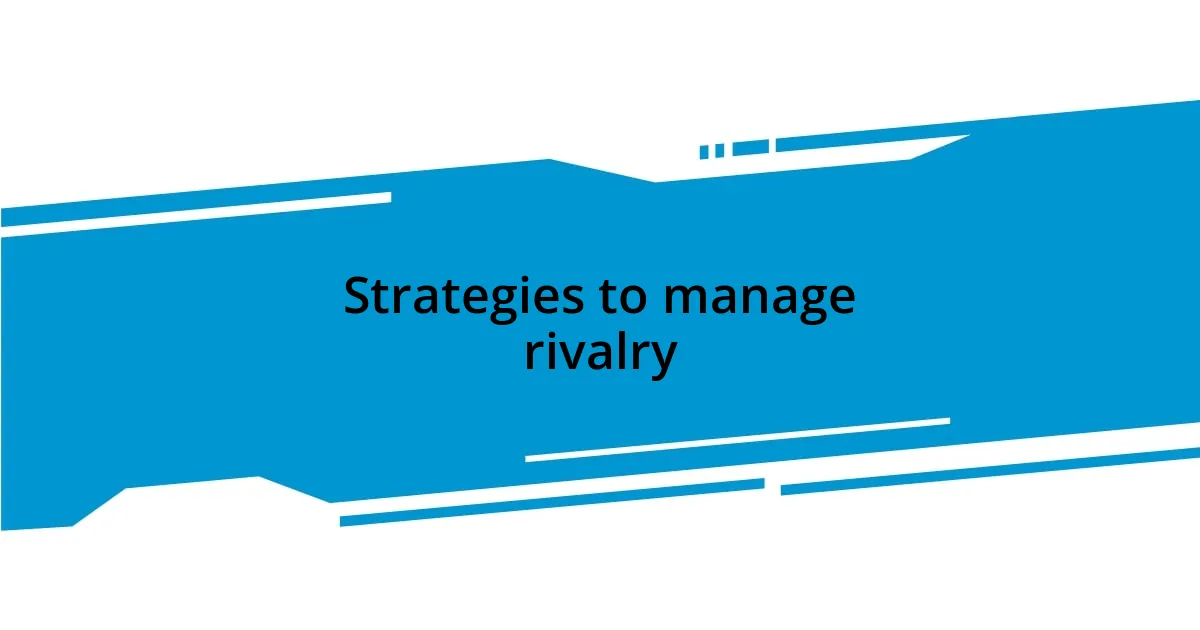
Strategies to manage rivalry
To tackle sibling rivalry, one effective strategy is to promote open communication. I’ve found that encouraging my siblings to express their feelings can quickly defuse tension. When they learn to articulate their emotions—like frustration or jealousy—they often realize they’re not alone in their experiences, fostering a sense of understanding.
Another approach I’ve used is emphasizing collaboration rather than competition. For instance, when my children face off in a game, I gently steer them towards teamwork activities. It’s fascinating how bonding experiences, like working together on a puzzle, can transform their dynamic, replacing rivalry with camaraderie.
Setting clear boundaries can also play a crucial role. I remember a time when my youngest sibling thought it was okay to borrow my things without asking, leading to a few heated moments. Establishing rules, like asking for permission first, not only helps avoid conflicts but also cultivates mutual respect. Have you ever noticed how a simple rule can change the way siblings interact?
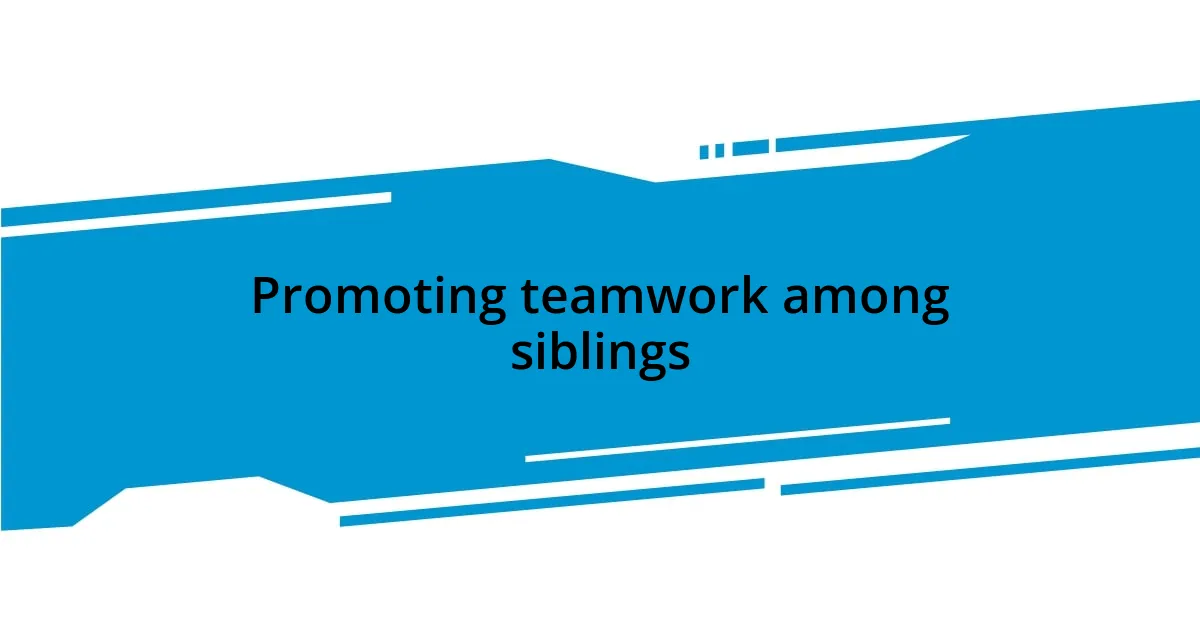
Promoting teamwork among siblings
Promoting teamwork among siblings is essential in fostering bond and understanding. I’ll never forget a weekend when I spontaneously organized a family scavenger hunt. The experience had my kids racing against the clock, collaborating to find clues hidden around the house. It knocked down any walls of rivalry and replaced it with laughter and teamwork. It’s moments like these that remind me how shared goals can help siblings unite rather than compete.
Additionally, I’ve noticed that incorporating family projects can encourage cooperation. One summer, we decided to revamp the garden together. Each of my kids had a role, which transformed what could have been just chores into a fun-filled opportunity to blend their skills. They often argue about who gets more involved in activities, but that day, they learned the beauty of working toward a common result while enjoying each other’s company.
Have you ever considered how some sibling rivalries can stem from feeling overshadowed? I once observed my children teaming up for a sports event together, and the joy in their shared achievements was palpable. Witnessing their excitement as they cheered each other on made me realize how important it is to celebrate joint successes. It’s in those moments that they learn unity is not a sacrifice; it’s a shared triumph that only strengthens their relationship.

Encouraging open communication
Encouraging open communication is crucial in managing sibling rivalry effectively. I remember a time when my children were arguing over a toy, and instead of immediately intervening, I paused and encouraged each of them to share their feelings about the situation. Watching them articulate their thoughts about wanting to play and feeling ignored was eye-opening—it transformed their argument into a discussion that eventually helped them find a fair solution together.
In my experience, creating a safe space for discussions has made a significant difference. I often set aside moments where my kids can sit down and talk, whether it’s during dinner or while we’re winding down for the night. It’s amazing how a little active listening can open up avenues for deeper understanding. Have you ever noticed how simply letting someone share their feelings can shift the entire atmosphere? I’ve seen it turn bitterness into an opportunity for connection.
Of course, not every conversation flows smoothly. There are times when emotions run high and conflicts seem inevitable. In those moments, I remind my children that it’s okay to disagree but vital to express themselves respectfully. I’ve witnessed that when they engage in constructive dialogue, it not only resolves the immediate issue but fosters empathy, leading to fewer conflicts in the future. Emphasizing this principle has helped them develop not only as siblings but as individuals who can communicate well.

Seeking professional help when needed
Seeking professional help can be a game-changer in managing sibling rivalry, especially when conflicts escalate beyond what I can handle. I recall a particularly challenging phase when my children’s bickering transformed into hurtful exchanges. It was tough to watch, and I realized that although I’d tried my best to mediate, perhaps it was time to bring in a family counselor. After just a few sessions, not only did the atmosphere at home improve, but I also saw my kids learn effective communication strategies that I hadn’t even considered.
Sometimes, it’s difficult to know when to seek that professional help. I’ve asked myself, “Is it just normal sibling squabbling or something deeper?” I learned that recognizing persistent patterns of rivalry—like recurring arguments about the same issues—signals that it might be time to reach out for support. A therapist can provide the tools needed for improved relationships, creating a safe space for each child to express their feelings. In my experience, taking that step not only alleviated the tension but also empowered my kids to articulate their frustrations in healthier ways.
Not every family is equipped to handle all conflicts solo, and seeking outside help doesn’t mean I failed as a parent. Rather, it showed my children that it’s okay to ask for assistance when needed. I remember feeling a sense of relief when we finally had a breakthrough during our sessions, as the children began to share their feelings and address the rivalry constructively. Have you ever experienced that enlightening moment when everything clicks into place? It left an impression on me that collaboration—whether among siblings or with professionals—can lead to long-lasting harmony.











